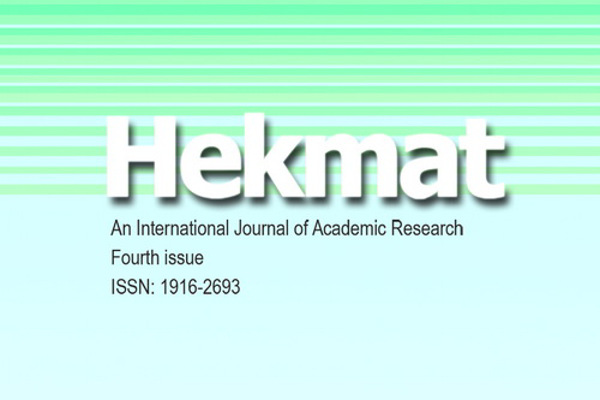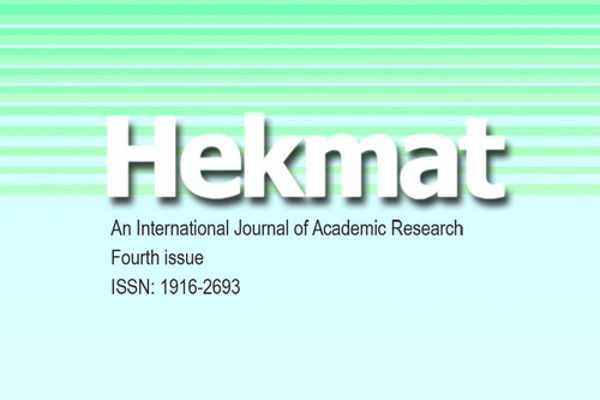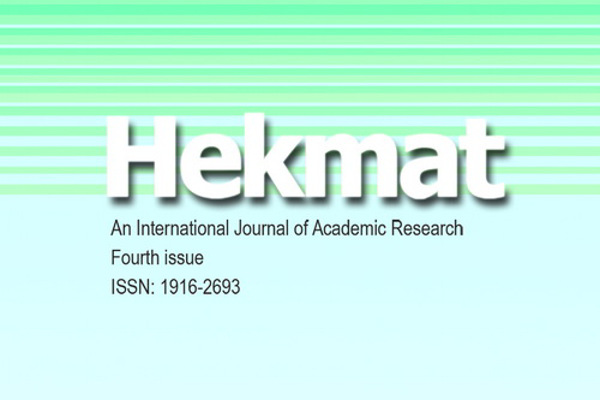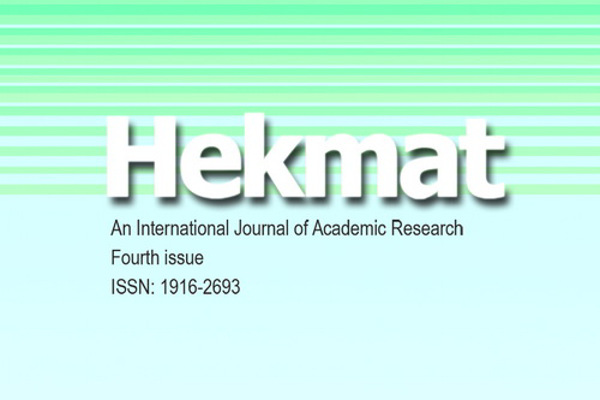Women’s Rights in Islam / By: (Sayyed Mondhir Hakim) (Heydar Amirpoor) (Azra Shalbaf)
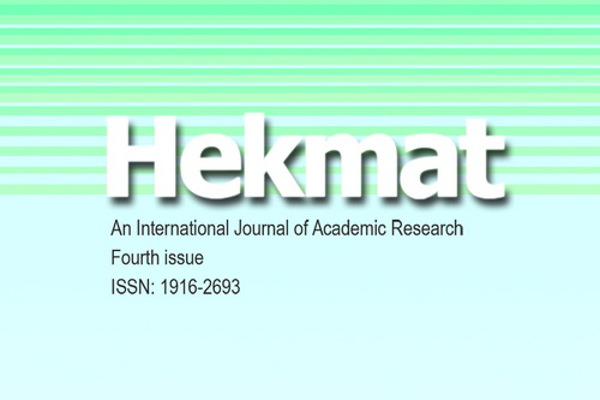
Women’s Rights in Islam
Sayyed Mondhir Hakim
Heydar Amirpoor
Azra Shalbaf
Abstract
Islam has a humane approach to the opposite sexes and sex differences and the exaltation of both men and women alike has always been foremost in Islamic teachings.
In order to prepare the ground for humankind to reach their perfection, the Divine legislator has regulated appropriate laws and rules based on the physiological differences between men and women. The religion of Islam guarantees social justice, equality of rights for both sexes with a humane approach to men and women, abstaining from individualism, and not overlooking the fundamental differences in physical and spiritual structure between the two sexes.
Islam bases the primary principle in women’s activities in the economic, political, and social arenas on the principle of freedom the scope of which is determined by religious commandments and rulings along with a careful consideration of criteria such as the flourishing of the female personality and character, not overlooking the rights of family members, the strength of family foundations which can lead to a healthy society, and upholding the importance of chastity, and family honor.
The reason for the existing differences in religious commandments must be found in their underlying philosophical wisdom and the practicality and effectiveness of religious rule deduction.
This paper, through an intra-religious analysis and a jurisprudential approach, examines Islam’s view of women, and concludes that the differences in the rights of men and women do not tell of gender discrimination but rather provide an effective way through which social justice can be achieved.
Key terms
Women’s rights, Islamic worldview, Islamic jurisprudence, religious commandments, religious laws
Introduction
The female gender has always suffered oppression throughout history. Disrespecting women’s individual rights (financial independence, individual ownership, etc) and depriving them of social rights (occupational, political, social rights etc) are examples of the past generations’ gross negligence of women’s rights. The instrumentalist attitude towards women and, as a result, men’s domination over women in families and societies in the past has been the consequence of policymakers’ negligence throughout history. The birth of a girl or existence of a woman in a family or tribe was seen as an utter disgrace.
In the public opinion, burying girls alive in the pre-Islamic pagan age was in itself living proof of an instrumentalist view of women:
“…and do not kill your children for the fear of poverty. We give them sustenance and yourselves too. Surely, to kill them is a great wrong.”[1]
“…and do not slay your children for poverty. We provide for you and for them.”[2]
As time passed, neglecting women was found to be no longer in line with concerns about strengthening the foundations of family and the flourishing of society. This was why, in the 16th century, there came to existence a number of schools of thought supporting women and defending their rights. Gradually, along with the publicity of the idea of equality of men’s and women’ rights, the supporters of the idea and lawmakers strived for regulating the same laws and obligations for the two sexes. The United Nations Organization too, in order to reclaim the rights of women and to enforce this reclamation, passed the Declaration on Removal of Discrimination against Women consisting of an introduction and as many as 81 articles, and in 1979, the UN General Assembly passed this bill under the title of “the Convention on the Elimination of All Forms of Discrimination against Women.” The basic concern of those who supported the elimination of discrimination against women was to achieve social justice. To reach the point of moderation, we should refrain from going to extremes. Just as the past generations had disrespected women’s rights at one extreme illegally and immorally depriving them of their rights, at the other extreme, the later generations while trying to support and protect women’s rights, caused the society such family and social problems, and as a result, gave birth to the crises of irresponsibility and the breakdown of families. Intra-religious studies show that all religious commandments and obligations in Islamic jurisprudence have been based on justice:
“Indeed Allah enjoins justice and kindness”.[3]
“Say, ‘My Lord has enjoined justice’…”[4]
His Holiness Imam Ali (A) said, “Justice is the lifeblood of divine laws.”
This view of justice in the area of family rights has reached the height of its potential in Islam due to its considerable significance.
Nevertheless, some legal authorities know the compilation and regulation of different rights for men and women in the noble Islamic law to be in conflict with the principle of justice and equality and have tried to show Islamic commandments to be unjust.
Investigating the casting of doubt by legal authorities and scholars is not the issue we are concerned with here. Rather, this paper aims to discuss how Islam has met with the female gender. We seek to know whether the regulation of different practical duties for men and women has been contrary to Islam's intended concern which is reaching a point of equilibrium, or whether it is the case that the religion of Islam has indeed taken the right path to the grounding of justice, and having taken into serious consideration the very real physiological differences of the male and female genders, Islam knows strengthening family roots, advancement of societies, and the exaltation of mankind to be all lying in the differences between the rights of men and women. That whether Islam's method is the proper one to be followed in the discovery of truth about women and their rights can be figured out by taking into account those sex differences. This paper, through an analytical study and a jurisprudential approach, examines Islam’s attitude towards women, and in the end, concludes that the differences between the rights of men and women are by no means unjust; but rather, they bring forward the truth and show that Islam opens up the proper path to justice and to establishing the rights of both men and women.
Hypothesis
The religion of Islam does not see equality of men's and women's rights in 'sameness’ which is a striving for similarity but, in many instances due to those very differences in their physiological and spiritual make up, depicts that ideal equality as differences in rights, that is, passing different laws for each gender.
Women in Islam
The founders of any school of thought lay out some principles, fundaments, and values for publicizing and propagating its advancement. The bases and fundaments of these values must be looked for in the particular worldview that each school of thought holds to. Today, epistemology, axiology, ontology, and anthropology are the main dimensions of the philosophy of different schools of thought. To look at the differences in the rights of men and women as a given premise, without taking into consideration the Islamic worldview in its anthropological dimension and then concluding sex discrimination is an unforgivable sin. If academic anthropology were to base itself on the foundations of Taylorism, man would be an instrument truly for making extra surplus and the production of capital and wealth. The result of such a view will be a sexist attitude since, in the acceleration of the economic cycle, men have greater efficiency than women. The effect of such a kind of thought is no doubt leads to the superiority of men to women, that is, the standard measure of judgment as to superiority will be their gender.
Therefore, attentiveness to the Islamic worldview in relation to women will be an answer to doubts and misgivings, and will result in abstaining from extremism in the regulation of laws relating to the similarity of the rights of men to those of women in Islam.
An intra-religious study shows that the religion of Islam takes a humanitarian outlook towards the question of sexuality.
That which has been the subject of focus as a criterion for judgment on superiority of gender has been neither production of wealth, utilitarianism, hedonism, and the like, but reaching for the heights of human exaltation:
{یا أَیهَا النَّاسُ اتَّقُوا رَبَّکُمُ الَّذِی خَلَقَکُمْ مِنْ نَفْسٍ وَاحِدَةٍ وَخَلَقَ مِنْهَا زَوْجَهَا وَبَثَّ مِنْهُمَا رِجَالًا کَثِیرًا وَنِسَاءً...}(النساء، 1)
“O mankind! Be wary of your Lord who created you from a single soul, and created its mate from it, and, from the two of them, scattered numerous men women”.[5]
{مَنْ عَمِلَ صَالِحًا مِنْ ذَکَرٍ أَوْ أُنْثَى وَهُوَ مُؤْمِنٌ فَلَنُحْیینَّهُ حَیاةً طَیبَةً...}(النحل، 97)
“Whoever acts righteously, whether male or female, should he be faithful. We shall revive him with a good life”.[6]
{هُوَ الَّذِی خَلَقَکُمْ مِنْ نَفْسٍ وَاحِدَةٍ وَجَعَلَ مِنْهَا زَوْجَهَا لِیسْکُنَ إِلَیهَا...}(الاعراف، 189)
“It is He who created you from a single soul, and made form it its mate that he might find comfort with”.[7]
{...هُنَّ لِبَاسٌ لَکُمْ وَأَنْتُمْ لِبَاسٌ لَهُنَّ...}(بقره، 187)
“They are a garment for you and you are a garment for them”.[8]
{...أَنِّی لَا أُضِیعُ عَمَلَ عَامِلٍ مِنْکُمْ مِنْ ذَکَرٍ أَوْ أُنْثَى بَعْضُکُمْ مِنْ بَعْضٍ...}(آلعمران، 195)
“I do not waste the work of any worker among you whether male or female. You are all on the same footing”.[9]
{وَمِنْ آیاتِهِ أَنْ خَلَقَ لَکُمْ مِنْ أَنْفُسِکُمْ أَزْوَاجًا لِتَسْکُنُوا إِلَیهَا وَجَعَلَ بَینَکُمْ مَوَدَّةً وَرَحْمَةً إِنَّ فِی ذَلِکَ لَآیاتٍ لِقَوْمٍ یتَفَکَّرُونَ}(الروم، 21)
“And of his signs is that He created for you mates from your own selves that you may take comfort in them”.[10]
{إِنَّ الْمُسْلِمِینَ وَالْمُسْلِمَاتِ وَالْمُؤْمِنِینَ وَالْمُؤْمِنَاتِ وَالْقَانِتِینَ وَالْقَانِتَاتِ وَالصَّادِقِینَ وَالصَّادِقَاتِ ... أَعَدَّ اللَّهُ لَهُمْ مَغْفِرَةً وَأَجْرًا عَظِیمًا}(الاحزاب، 35)
“Indeed the Muslim men and the Muslim women, the faithful men and the faithful women, the obedient men and the obedient women, the truthful men and the truthful women, the patient men and the patient women, the humble men and the humble women, the charitable men and the charitable women, the men who fast and the women who fast, the men who guard their private parts and the women who guard, the men who remember Allah greatly and the women who remember [Allah Greatly], Allah holds in store for them forgiveness and a great reward.”[11]
{وَمَنْ یعْمَلْ مِنَ الصَّالِحَاتِ مِنْ ذَکَرٍ أَوْ أُنْثَى وَهُوَ مُؤْمِنٌ فَأُولَئِکَ یدْخُلُونَ الْجَنَّةَ...}(النساء، 124)
“And whoever does righteous deeds, whether male or female, should he be faithful; such shall enter paradise.”[12]
etc…
The above verses show that Islam does not see sexuality as a criterion for superiority, and is disgusted by an instrumentalist attitude towards men and women. Men and women are created from the same soul and reaching their due perfection and exaltation is Islam's greatest concern. From an Islamic perspective, piety is a measure of superior value.
In order to reach the position of piety, it is first necessary to be aware of that which counts as a measure of humanity as God says in the Holy Quran, “Indeed the noblest of you in the sight of Allah is the most pious among you.”[13] Belief in God, obedience to divine law, and having good manners are among the fundaments of piety.
The above verses clearly show that for man to reach the greater heights of perfection and for the flourishing of human societies, a humanitarian view on sexuality irrespective of male or female is inevitable. Because the family unit is the most important social institution and the development of society is dependent on the well-being and strength of this social unit.
The religion of Islam sees affection and mercy as the main pillars for reaching the true intended perfection through the efforts of both sexes. Therefore, to infer men’s sexual superiority and dominance over women from the verse “men are the managers of women”[14] is a superficial reductionist understanding of the verse bringing the human dimension of the two opposite sexes down to its lowest levels.
The advantages of the Islamic Worldview
A careful look at Islam's view of women is a way to explain women’s particular personality and establish their rights. The Islamic worldview is reminiscent of a humanitarian look at sexuality. From an Islamic perspective, regarding the sexes as different will help us reach precious and cherished values some of which are as follows:
- Exaltation of humankind irrespective of sexuality is the ultimate goal. On this path, both men and women shall face many obstacles and suffer many hardships since their actions shall be put to judgment. In achieving beatitude and perfection, men and women are interdependent but not with an instrumental approach which would take us on the route to the neglect of the final goal of creation.
Women are independently an aim of creation just as are men, and they own an independent identity. Neglecting the human dimension of the female gender brings forward a distancing from its identity, a constant seeking of variety in deriving pleasure from it, regulation of similar rights to those of the male, and an instrumental attitude towards it.
- In Islam, being male or female is, either way, an opportunity and blessing not a violation, deficiency, and threat. Just as men, based on their physical and mental characteristics, have responsibilities and duties to themselves, their families, and society, women too have certain responsibilities to themselves and others. Men and women have to climb the same stairway to perfection, are free-willed, are equal in rank and degree as to their human qualities and values, and should have a sense of responsibility. Therefore, taking a threatening stance and adopting sexist attitudes towards either sex shall narrow our horizon setting the stage for a slanted line of vision, and will take us to a crisis of self-indulgence, assimilation, distortion of individual behavior leading to social decadence and decline, and finally the damages of individualism shall tie us down.
Acceptance of Differences Between Men and Women
Injustice against women and inequality of their rights to those of men is as unjust and oppressive as ignoring their natural, physical, and social differences with those of men. Medical doctors and psychologists have stipulated that men and women have different physical and psychological characteristics. The differences in brain hemispheres, in potentials for spoken and oral skills, in physical growth and muscular power, in outlooks, and in spiritual characteristics etc are some of the fundamental natural differences between female and male.
Is it then possible to take two completely different qualities and claim that they are similar, and expect them to carry the same duties and responsibilities? If a good look were to be taken, the truth would be that justice has wide-angle lenses, a broad definition, and a wide scope, and in each of its dimensions, there is an individual and a society.
In individual life and family life too, justice does not come with the meaning of equality of rights and liabilities, but rather, a consideration of talents, standings, abilities, and the capabilities of creation. Gender equality means appreciating women, holding them in high esteem, and overlooking gender differences in physical and spiritual characteristics. The principle of fairness dictates that, based on physiological differences, from the perspective of religious jurisprudence and law too, both men and women should have due responsibilities, duties, and legal and moral obligations.
Women’s Rights in Islam
Islam has declared certain percepts and commandments in different areas of worship, individual, family, and society, in which there are no differences between men and women. The legislator, in regulating specific laws to women, takes into account an especially humanistic stance and this time, it sees social justice and equality of rights to be best served by defining different obligations.
In Islam's religious rulings, the individualistic outlook and ignoring of physiological differences between men and women is avoided. The various social, economic etc activities of women are set within the framework of laws whose applicability is along the lines of that which Islam envisages within its worldview. Woman as a social being has certain religious responsibilities and these in turn are born out of her having independence and freedom of choice. Responsibilities and laws specific to women must be separately investigated in different areas.
Act of Worship and the Religious Rulings
This section relates to the inner relations that exist between man and God. In order to regulate these inner relations, the lawmaker has prescribed laws which apply to both men and women arbitrating proper actions such as skills, prayers, fasts, Hajj, jihad, vow, and oath. Of course, in some cases, there exist certain physical forms and changes in women's physiological make-up in relation to which these rulings take secondary place. For instance, saying prayer is totally forbidden for women during menstrual period, spotting, and postpartum bleeding. Also covering for women must be full and they should abstain from wearing revealing clothes especially those which would reveal their private parts:
“… and not to display their charms except for what is outward …”[15]
However, wearing silk attire and gold, while being forbidden for men except on certain circumstances, is permitted and proper for women.
If the religious binding and necessity of attending the Friday prayers for women is taken off, it is not intended to belittle them but, in fact, the legislator has kindly tried to make their affairs easier. If only men are allowed to lead the congregational prayers, it should not be seen as depriving women of such a worship affair, but it is indeed intended to facilitate the religious obligations for women based on special considerations. Taking care of the forgone and omitted religious obligations of a deceased father by his oldest son is sure in women’s favor. Generally speaking, wherever there is talk of impermissibility of an act of worship for women, the reason will be either the existence of certain physiological conditions or attaching considerable importance to family rights (e.g. a wife’s validity of vows depending on her husband’s consent, a mother’s extinction of obligation to fast during breastfeeding) and preserving women’s social dignity, but not to belittle them.
Economic Interactions
Islamic laws on economic interactions are general and apply to both men and women. Based on the jurisprudential rule, “people have full control and dominion over their property,”[16] women are financially independent. In Islam, women’s economic activities are considered from both premarital and post marital perspectives. In addition to their financial independence, women have the right of possession and management of their own property and inherit certain shares of their parents’ property. The difference between boys’ and girls’ shares of inheritance is only true for parents’ common collateral as well as paternal collateral. However, when it comes to maternal collateral, girls and boys inherit equal shares. The scope of women’s financial independence broadens after marriage. Besides their financial possessions, women are entitled to marriage portion, alimony, quantum merit for their services at home, and remuneration for breastfeeding.
Dowry
Assets that are endowed to a bride upon the marriage contract, which the man is required to pay and is enforced by law: “And give women their dowries as an obligation.”[17]
The philosophy of dowry must be found in the respect awarded to the personality of a woman and not as a value of her own self. Dowry is an anticipation of possible unexpected future incidents on the part of God being endowed on women so that they may not give themselves to the men they are going to marry, without a financial offering. As soon as the marriage vows are pronounced and the marriage contract is concluded, women have the right of possession of their dowry and it will be an obligation on the husband to pay.
Alimony
It is the provision of living expenses given by the male partner. After marriage, a woman becomes entitled to being paid her alimony. Men, due to greater physical ability, are obliged to satisfy needs such as clothing, food, household accessories, and the medical and sanitary expenses of his wife.
Quantum Merit for Housework
Islam has respect for the work a woman does at home and allows economic value for it. As long as she does not intend to do the housework gratuitously, in addition to the above preferential treatment, she is also entitled to receiving a reasonable value for her work and the time spent doing it in the home.
Of course, the work of European women remaining unpaid was one of the shortcomings that the Supervisory Committee of the Beijing Declaration revealed, which was then given the status of “women’s hidden poverty” as they were not paid their due payment for the work they did at home.
Remuneration for Breastfeeding
Islam, while paying respect for a mother’s sympathetic and self-sacrificing behavior during pregnancy, sees her as the closest person to that child and entitles her to remuneration for her breastfeeding: “Then, if they suckle the baby for you, give them their wages and consult together honorably.”[18]
Continuation of Economic Activities after Marriage
The lawmaker has allowed the financial and business activities of women to be continued after marriage in as far as they do not interfere with the Islamic worldview, the rights of family members, and family honor and respect.
In fact, Islam has taken seriously the capabilities of women in financial and economic activities, and in as far as the religious commandments are kept intact, it has held in high esteem their being present in the process of social development and advancement. The economic activities of Khadija (S) and her financial independence was a good proof of this attitude towards women, and her wealth was instrumental in the expansion of Islam and the reinforcement of Islam's army.
Women’s Social Activities
Among the most considerable cases of doubt cast by other schools of thought over Islam’s worldview is the issue of women’s social activities. Islam does not stand against women’s social activities, and in fact, due to their constructive role in the growth and development of the society, in many cases it allows for their contribution to social arena. Just as their economic activities, women’s social activities too can be considered from both premarital and post marital perspectives. With regard to premarital social activities, Islam considers women’s spiritual personality as the criterion for entering the social arena. Educating and training others, working in the fields and areas specific to women like ladies’ hairdressing, delivering sermons on religious issues in women’s gatherings, singing songs in women’s gatherings, and working in medical fields etc, are among the most important social activities of women. Training and education are the fundaments of cultural independence, and ignorance is the greatest enemy of humankind. No religion has ever stressed the importance of lifelong knowledge acquisition more than Islam. Only mothers who see the success of their children in the training and upbringing they provide for them can be considered successful mothers. Effective training yields informed and responsible mothers who can then bring up and train healthy and sensible children for the society, and the increase in number of healthy people yields the honor and authority of the Islamic society. Her Holiness Fatima (S) was the greatest teacher and interpreter of the Holy Quran and had a pivotal role in training and enlightening the women of her time.
Women's Occupational Activities
Regarding certain needs of society, financial considerations, and the innate talents women possess, it is inevitable for women to appear in particular kinds of occupations. Due to the limitations and prohibitions for men in religious ceremonies like burials and weddings, in women's make-up and beauty salons, and in family counseling etc, women should take these jobs. Women engaged in the occupation of hairdressing and beauty can both make a living and help other women keep their chastity and honor intact. In all, women's economic and professional activities in the social arena are allowed in so far as they do not endanger their dignity and chastity, the sanctity and strength of family as a social unit, exaltation of society, and family honor.
Judicial Activities
Women have been exempted from passing judgment as judges due to their emotional sensitivity. However, their standing as witness is permitted depending on the subject at hand. If it is the case that the issue is related entirely to women's affairs and faults, their testimony is sufficient. In some other instances, however, male witnesses are required and in financial claims, women’s testimony along with men’s will help in bringing about settlement of the case and justice therein. Women’s working as lawyers is permitted as far as it does not interfere with family rights and expectations. In matters relating to prescribed punishments and compensation, if the compensation payable for the crime committed is more than one third of a full compensation, then the male are awarded compensatory damages twice the amount awarded to women.
Political Activities
Khadija (S) was the Prophet's most favored companion and supporter in propagating the religion of Islam. Her Holiness Fatima (S), delivering various sermons in defense of Imam Hussein (S) and his followers’ rightfulness, had a role as significant as and no less than that of the martyrs themselves. The above examples are showcases for Islam’s view of women’s political potentials and assert that, standing next to men, women have made significant contributions to the enlightenment of people as to the political issues of their times and to the explanation of the truth versus falsehood. In the constitution of the Islamic Republic of Iran, there has been no prohibition put on the full participation of women in the political arena at all levels even as the president, a member of parliament, and the like.
Conclusion
The exaltation of women is one of Islam's greatest concerns. The divine legislator has foreseen differences in the religious duties and obligations for the two opposite sexes due to their different physical and spiritual make-ups, and considers this attitude towards the two sexes and their due obligations to be of great practical significance in the fulfillment of Islam's goals such as the establishment of social justice, growth and safeguarding of women’s personality, strengthening of family as a social unit, and the well-being of society. This viability for being endowed with certain responsibilities is indeed telling of the female spirit as open to duty and responsibility, which is born out of free will and her multi-dimensional capabilities. In order to reach equilibrium between religious duties imposed on men and women, Islam has regulated the behaviors and functions of women according to Divine law and ethics.


